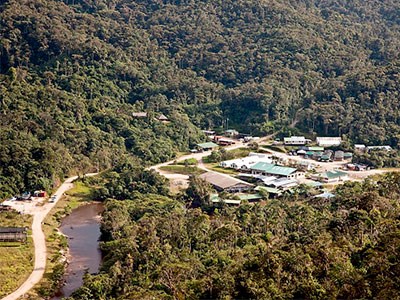Trainers at Confederation College are anxiously awaiting the run-up to development of a new mine in Ecuador where they’ll be helping to prepare a workforce to support a major gold project.
Last March, the Thunder Bay college signed a training agreement involving Lundin Mining and Universidad Técnica Particular de Loja in support of the Fruta del Norte gold project now in the advanced stage of development.
Don Bernosky, the college’s vice-president of regional workforce development, said Lundin is still going through the permitting process, which will set the stage for other mining development across the country to come ahead.
“We’re looking at some strategies on how we want to deliver and operate. Until they actually get the green light to start this development, we’re in a holding pattern at this point.”
The Lundin Group of companies acquired the project from Kinross Gold, finalizing the sale in December 2014 for US$240 million.
The Canadian-Swedish miner wants to put into production one of the world’s largest undeveloped and highest-grade underground gold projects, and do it within two years.
Bernosky said the miner expects to release its feasibility study by the end of March and have government permits to proceed with a mine by June.
“Then it’s showtime. It’s a really compressed scale of development with the road going in, the (mine) portal, processing, and a lot of construction.”
The Universidad Técnica Particular de Loja, Ecuador’s largest technical university, is currently building a training centre in the province of Zamora, close to the mine site.
Confederation will train the skilled and semi-skilled workforce training for the mining operation, said Bernosky.
As part of the negotiations between Lundin and the government, up to 80 per cent of the mine’s workforce must be Ecuadorean.
The college will replicate a version of their Ring of Fire Aboriginal Training Alliance (RoFATA), an industry and First Nation partnership that has produced graduates in occupations such as environmental monitoring, line cutting, remote camp cook, diamond drill helper and heavy equipment operator.
Bernosky said through discussions with the university, “we’ve talked about community engagement and how we establish career pathways so it ultimately harmonizes with their programming leading up to degrees in other areas. We’re doing more of the vocational side, which is not their expertise.”
At the start, Confederation staff will be involved in assessing literacy rates and other basic foundational skills of student applicants. More technical offerings will come later as the curriculum starts to take shape.
“That’s the goal,” said Bernosky. “We’re doing the intake and getting an understanding of the level of preparedness relative to Canadian and international standards. How much, physically, we’ll be doing has yet to determined.”
The college will be working with the Lundin Foundation, the philanthropic arm of the Lundin group of companies, which works on corporate social responsibility endeavours and sustainable development in working with communities near their mining operations around the world.
“They’re very good to work with and very knowledgeable with operations globally. They’re very progressive and operate under four pillars of sustainable looking at government relations, community engagement, supply chain development, and education and training.




